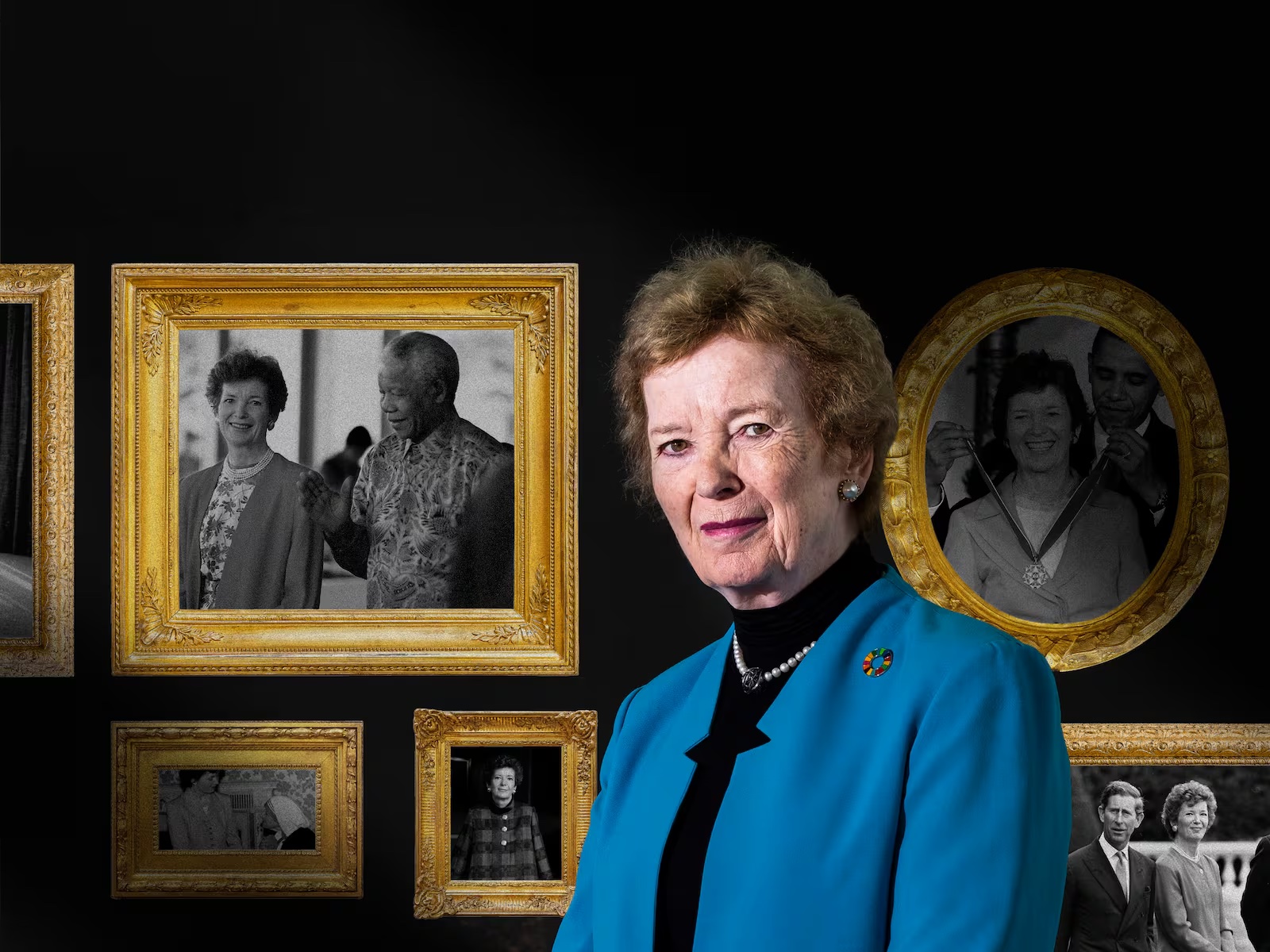The former president, now 80, talks about pushing past shyness, how she was ‘bullied’ into a documentary about her life, and her fears for the US and climate change
Deirdre Falvey, The Irish Times
August 17, 2024
“I learned a great phrase from my father, who didn’t retire from being a doctor, and died at 87. He said, it is better to wear out than to rust out. I take that very seriously. I’m not a good person at rusting. I don’t want to retire from things. I want to continue to be active, as long as my health continues and Nick’s in good form.”
These days Mary Robinson and her husband live in “a very small apartment in Donnybrook and we’re very content. We downsized completely, in order to be prepared for the next stage in our lives, which is coming as it always does, where we are less mobile et cetera. Although I’m very busy at the moment. I like being busy.”
That busy-ness with her causes extends to her clothes. Today, attired in her signature black polo neck and jacket, she wears two symbol-brooches. One represents the Sustainable Development Goals for 2030, drawn up in 2015 when she was UN secretary general Ban Ki-moon’s special envoy. The other is for Project Dandelion, a global climate justice campaign. Dandelions are a perfect symbol for it: resilient, edible, with roots that are regenerative of the soil, and propagated by (Robinson mimes it) blowing.
“We’re seeding the idea through women’s leadership, that we are the majority in the world that wants action on climate. We’re on the cusp of a clean-energy, healthier, safer, fairer world. Project Dandelion is women-led but not women-only. We want to encourage politicians to have more courage.”
There’s something about Mary. Somehow, when she talks about climate change and the challenges facing us all, she’s not preachy or worthy but inspiring. She gets the tone, of do-ability and hope, right. But it’s also, surely, because of who she is, and because of our memory of her role in changing Ireland, that we are happy to believe that she might help change the world, too.
We’re chatting in advance of the release of a new documentary about her and her many roles in life: as former president of Ireland, former UN high commissioner for human rights, former reforming constitutional lawyer and senator, current climate activist and chair of the Elders, fearless barrier-breaker and change-maker, and all-round accomplished, admirable and inspiring person.
We’re a few kilometres from each other but, even in a post-restriction world, she’s adamantly “only available virtually” for an interview. Is it the shyness she has discussed overcoming, or a desire for control, behind this remove, which adds to her natural reserve? She explains: she has an impossible week, she’s off to Belfast that afternoon, with several video calls first, and “a whole lot of Elders stuff” to finish. “It’s quite a burden,” she says.
I had to force myself to debate. I lost my train of thought. Even in
the middle of a debate, I would just go blank. It was very
embarrassing
Loosehorse’s beautifully made documentary Mrs Robinson, directed by Aoife Kelleher, encompasses the many phases of a life dedicated to having an impact and making a difference. As well as multiple commentators and terrific footage, there are lovely, crackly home movies from Robinson’s childhood, showing her playing rambunctiously with her brothers, and scenes that show the studious teenager that she was.
In Robinson’s face now, aged 80, you still see, clearly and recognisably, that child playing in the sea, the idealistic girl wowed by the Universal Declaration of Human Rights, the young Trinity student, the reforming lawyer and senator, and the newly elected president aged 46.
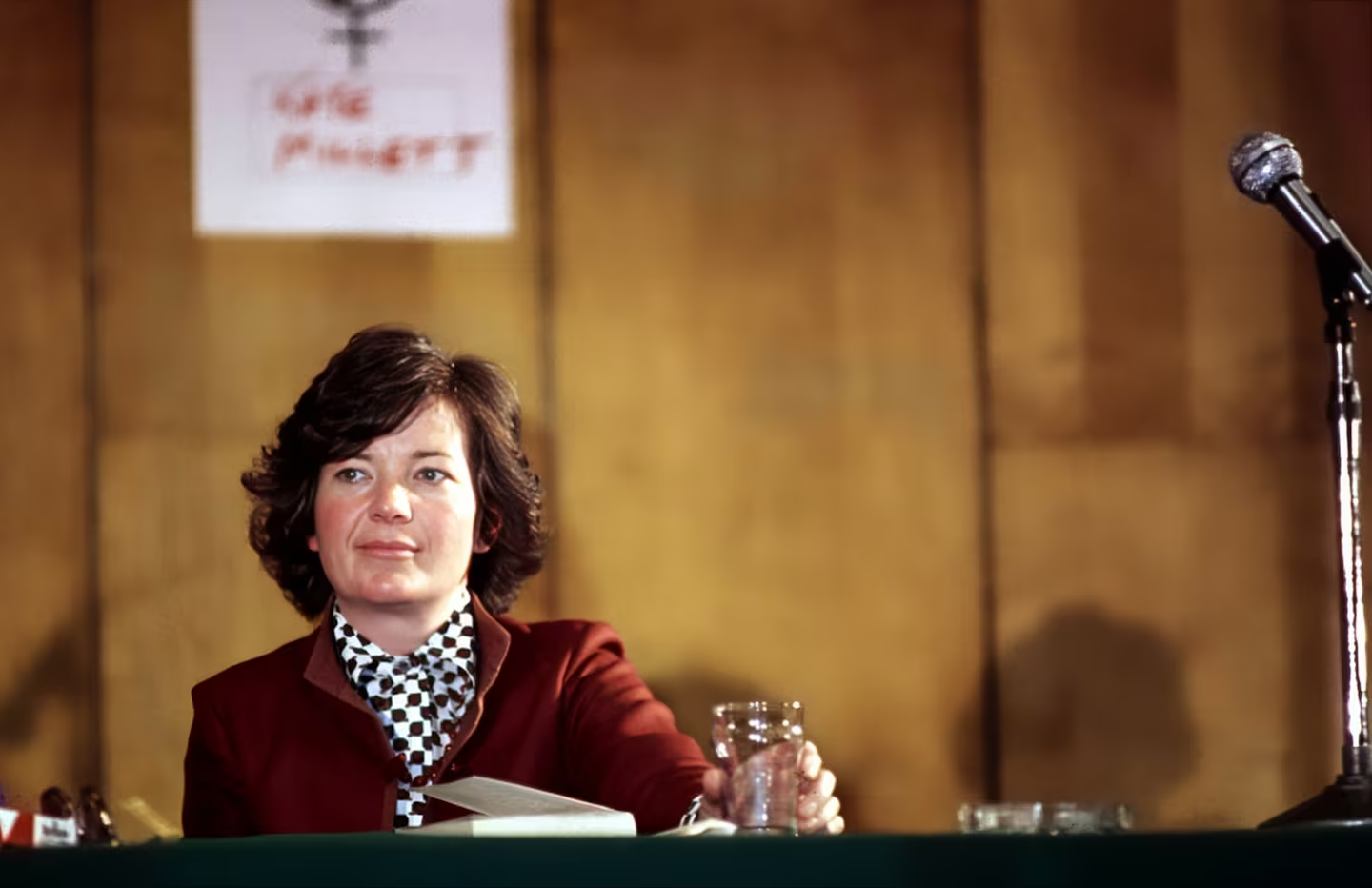
That same erect bearing, the same clear eyes, serene face. In this 90-minute spin through her life, her younger self inspires her older self, where we still see that girl who grew up in Ballina, Co Mayo, with a tangible early sureness.
Her confidence, she says, came “from the constant encouraging of me by my parents, that I had the same opportunities as my brothers”, despite that “this was so clearly not true in Irish society. It made me want to make it true. I seemed to have that inner sense of justice from an early age. It helped to care about human rights and justice and gender equality, to have these four brothers I had to compete with.”
She overcame great shyness. In college, “I had to force myself to debate. I lost my train of thought. Even in the middle of a debate, I would just go blank. It was very embarrassing. And I remember it. I want to use that, to encourage people to break through barriers, and make the best of their opportunities.” Constant debating was “like going through the wall, and it got easier”.
Later she taught law. Even now, decades on, she has not forgotten one day as a part-time junior teacher in UCD, asking the 100-plus students in her law of torts class, spread all over the huge lecture hall on Earlsfort Terrace, to move closer. “And they thundered down, to tease me. I got very embarrassed and blushed. And they said: she’s blushing. She’s blushing! That made it worse. I was shy, I was a bookworm. I was a tomboy. I didn’t come from a political family. Yet my life turned in a particular direction. I think that was what Bride wanted to bring out in the documentary.”
“Bride” is Bride Rosney. She’s present in the film, which is dedicated to her. Robinson’s erstwhile adviser, strategist and friend died suddenly last September aged 74. “I didn’t actually want to do [the film] initially,” says Robinson. “I was pushed – I would say bullied – by Bride Rosney. Her idea was that it needed to be inspirational and remind people of the time but also, hopefully, encourage particularly young people and women to reach their full potential. She was very keen on the impact it could have.
“She made it easy for me to come to meetings with the production team, the wonderful Aoife, and Cormac [Hargaden, producer, along with Trisha Canning]. Then, five days after the film was finished, she slipped away in her sleep. Now it has to work, because Bride put her heart and soul into it.”
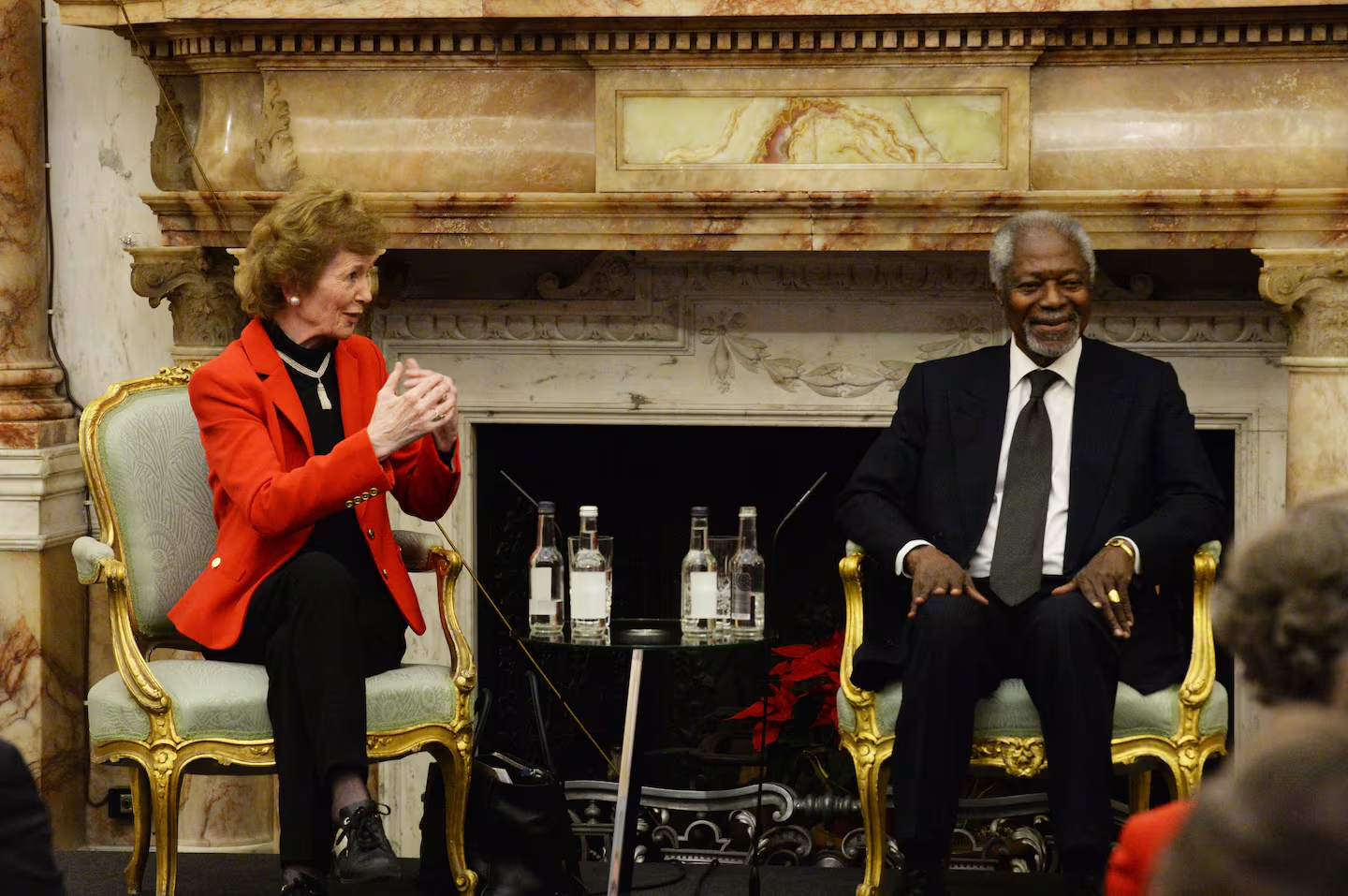
It was a shock. “She wasn’t ill. And she was only 74, which to me is very young now. She was godmother of our youngest, [Aubrey], who’s 43. Viewing the film is bitter-sweet. Because she’s in it, obviously, and she always watched my back as she did for the Princess Latifa episode, which wasn’t my finest moment, to say the least. You see her covering for me [in the film], saying I let my heart rule my head, which I did.”
In 2018 Robinson was manipulated into vouching for the safety of Princess Latifa Al Maktoum in Dubai, who accused her father, Dubai’s Sheikh Mohammed bin Rashid al Maktoum, of holding her hostage. Robinson later described it as her biggest mistake and said she had been naive. Now she talks about “a blind spot as a friendship moment [with Princess Latifa’s mother-in-law]. But it was a big mistake.”
There are other regrets. “I made the mistake of not serving out my full term, [of being] bullied by Kofi Annan” into leaving the presidency a few months early. “I was afraid if I didn’t, he would find somebody else. I (a) very much wanted the job, and (b) didn’t have any alternative in mind.”
At a press conference in the film we see Robinson talk about looking forward to becoming high commissioner in December. Kofi Annan leans in to correct her: September, he says. “I’m glad those mistakes are covered in the film,” she says. “That’s one thing I’ve learned: don’t be afraid to show your vulnerabilities. They’re part of you.”
Does she worry that her Latifa misjudgement will be remembered forever? “No, I want people to know everybody makes mistakes. And we go on.”
Robinson was part of a generation responsible for modernising Ireland, throwing off the shackles of the old order, championing contraceptive reform and decriminalising homosexuality.
“I was fortunate enough to be elected to the Senate in 1969,” she says. “That only happened because of [going to] Harvard, which gave me what Nick called, teasing me, my ‘Harvard humility’. He meant the opposite!” Robinson dared to challenge the male professors who were generally elected by university graduates to the Seanad. “I challenged and I got the support of key people in Trinity, who saw this young woman and gave her a chance. That in itself was unusual. I was lucky they gave me the opportunity. From 1969, for those 20 years in the Senate, I did feel part of a constant beginning of opening up. It was happening.”
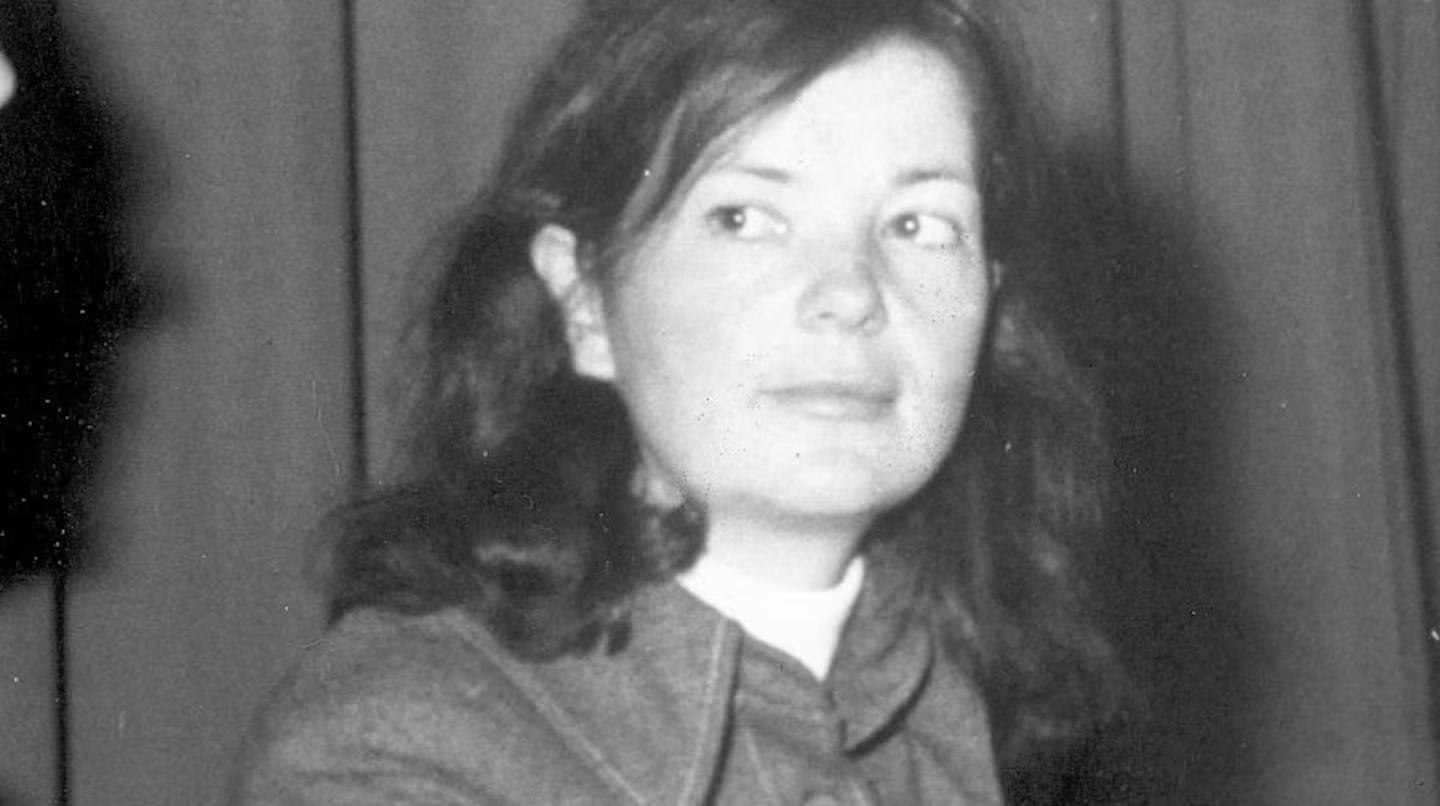
Initially Robinson was one of six women out of 60 in the Seanad, who “didn’t really gel”. Later, when there were 13 female senators and they teamed up with female TDs, “we got changes, advocating together”, including changing the law to criminalise marital rape.
Later she used the presidency to change the narrative in the North. She recalls lots of laughter, “sitting on the floor at the Áras, with women’s community groups who had travelled down. That incredible emotion of being recognised for being Irish, that Irish sense of song, music, the flowering through somebody being prepared to recognise and to listen.”
Early on she had considered becoming a nun. Later she challenged conservative Catholicism and she married a Protestant. “I’m certainly religious in the sense of, I still do believe that the gospel of Jesus Christ is the highest standard we can hold ourselves to. I do try to hold myself to that standard. And I fail constantly. But I try to fail better.” Is she still a Catholic? “I regard myself as [one]. Yes.
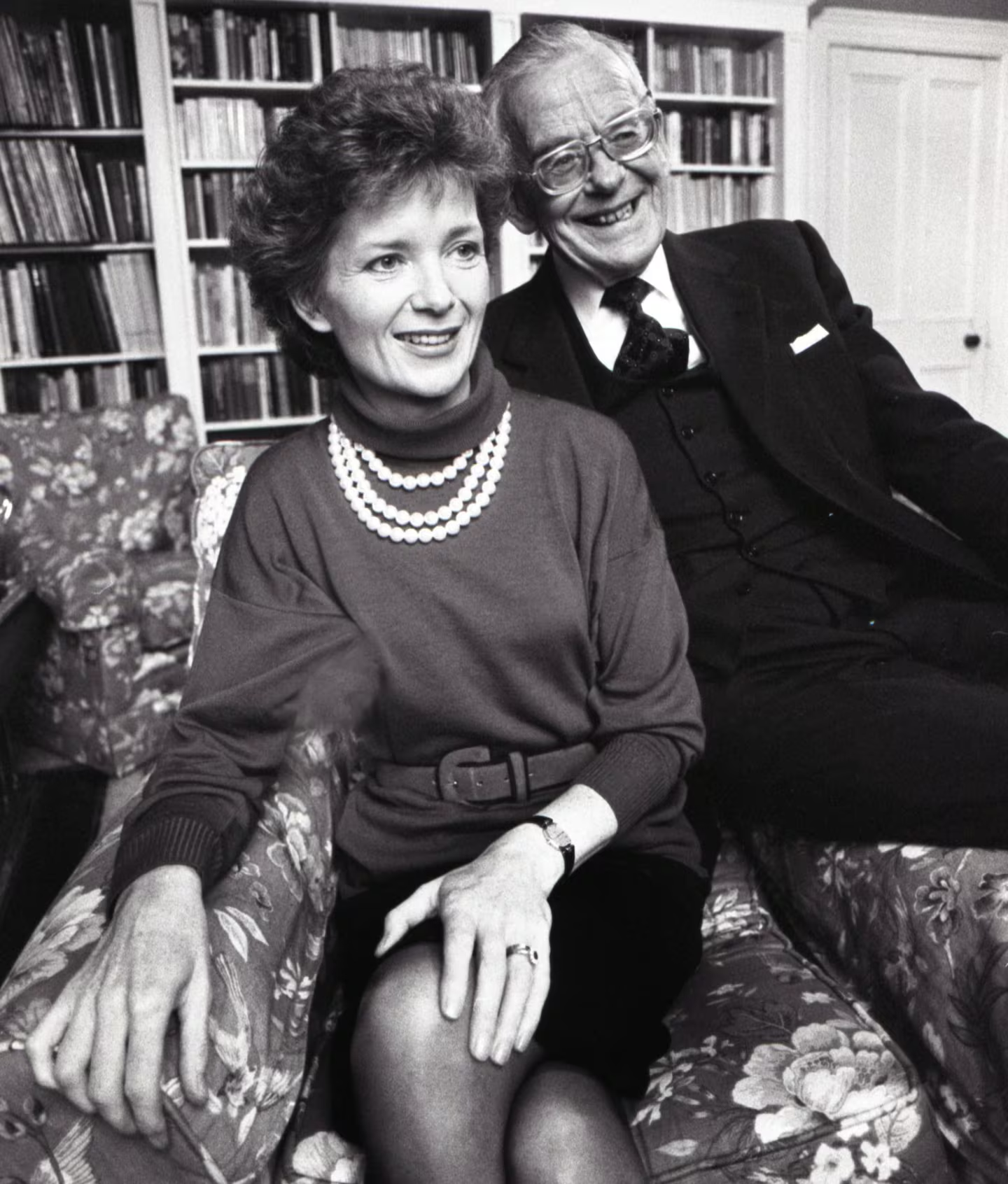
“We are seeing a world where there’s a lot of divide, and misuse of religion. That happened [over generations] in Ireland as well. The interference with private life, because of a Catholic dominance, was one of the early sparks to me of working for justice, working for the freedom of people to love whom they loved, if they were consenting adults.”
Her early sureness applied also to knowing Nick was the right man to marry. “My parents had me on a pedestal. They were committing what I would call the sin of overlove. They felt nobody was good enough for our Mary. They had an ideal: a professional person who was maybe a bit older, well able to look after me and give me everything I needed, for their special Mary. The more they were in opposition to Nick, the more I realised – and he was very persistent in his love – he was actually the right person. It was being forced to be more certain, by the opposition of my parents, that blessed me with the right decision. And 54 years later, I know it was the right decision.”
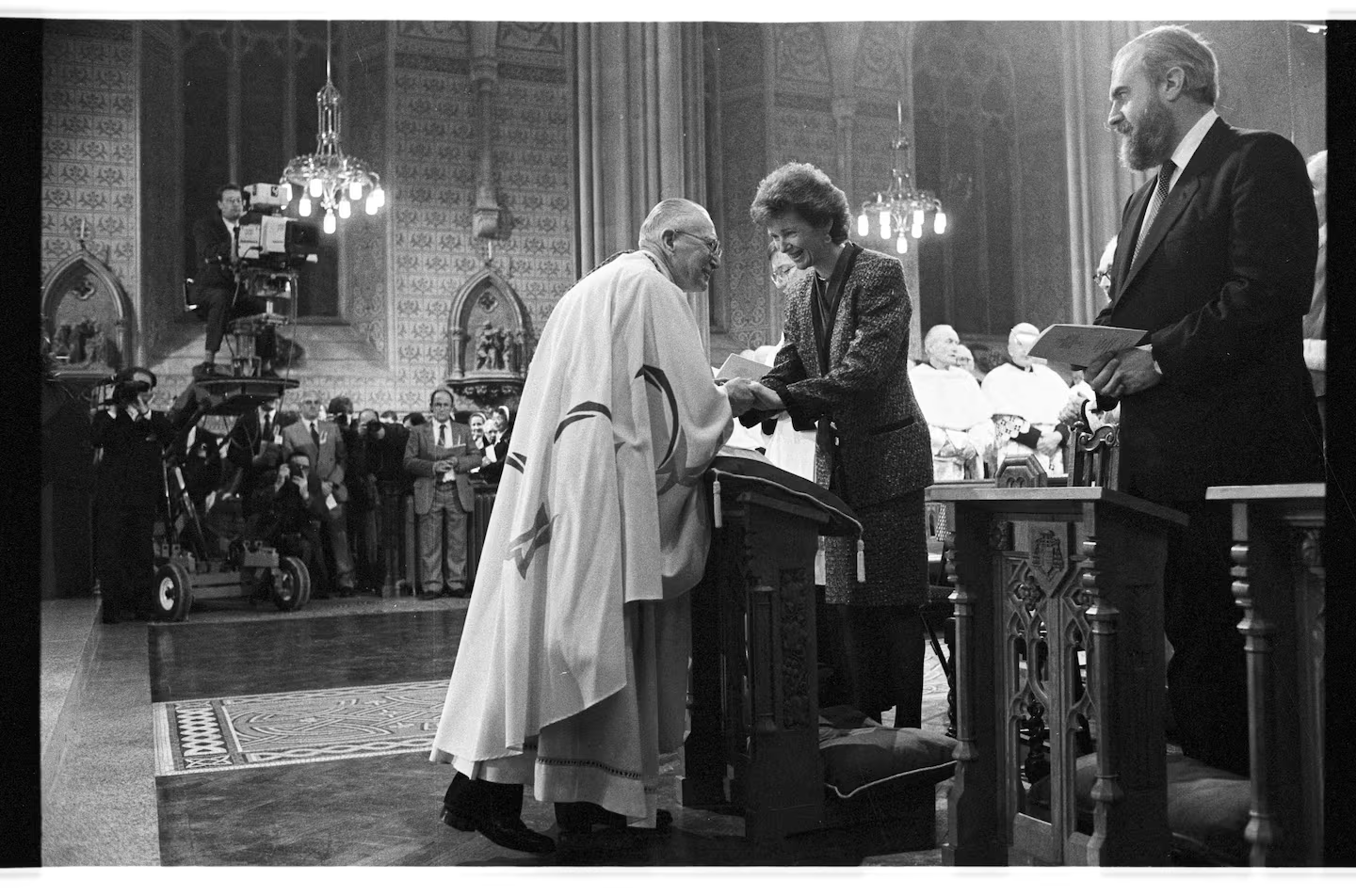
Though they reconciled, it now seems incredibly harsh that her parents didn’t come to their wedding. “These things were not talked through in the same way [then]. We moved on. Luckily Nick moved on seamlessly, because he seemed to understand my parents and their problem of overlove.”
Today it might seem anachronistic for someone with a lifelong commitment to gender equality to take her husband’s name. She did it to reinforce her marriage for her parents, but also “for the whole world, because I had quite a reputation as Senator Mary Bourke. I wanted to make it clear I was, from now on, the married Senator Mary Robinson”, even if it did bring her down the list on ballots, she says with a laugh.
“I wanted to have one profile, and the ‘me’ was now going to be Mary Robinson. Everybody is affected by their own journey in love, and for me that was an important part of sealing our love.”
Of all her achievements, most significant for her was “probably the presidency. It was seven years of extraordinary opportunity, to get to know the country even better, to represent locally, by visiting local communities and seeing what they were doing in their development, and nationally, and internationally. We worked very hard, Nick and myself, for those seven years. But we also enjoyed it hugely. I’ve been very lucky in my life. Each stage has brought me the opportunity to express my strong sense of trying to bring about more fairness and justice.”
She won’t be drawn on the subject of the next president. “One of my hardest decisions was not to seek a second term, which I knew was pretty well guaranteed, because I loved being president. I was persuaded by the argument to hand over now and let somebody else bring that further. Mary McAleese did a very good job. Michael D Higgins is doing a very good job. And I think the presidency has a sufficient standing with people now that we will have good candidates.”
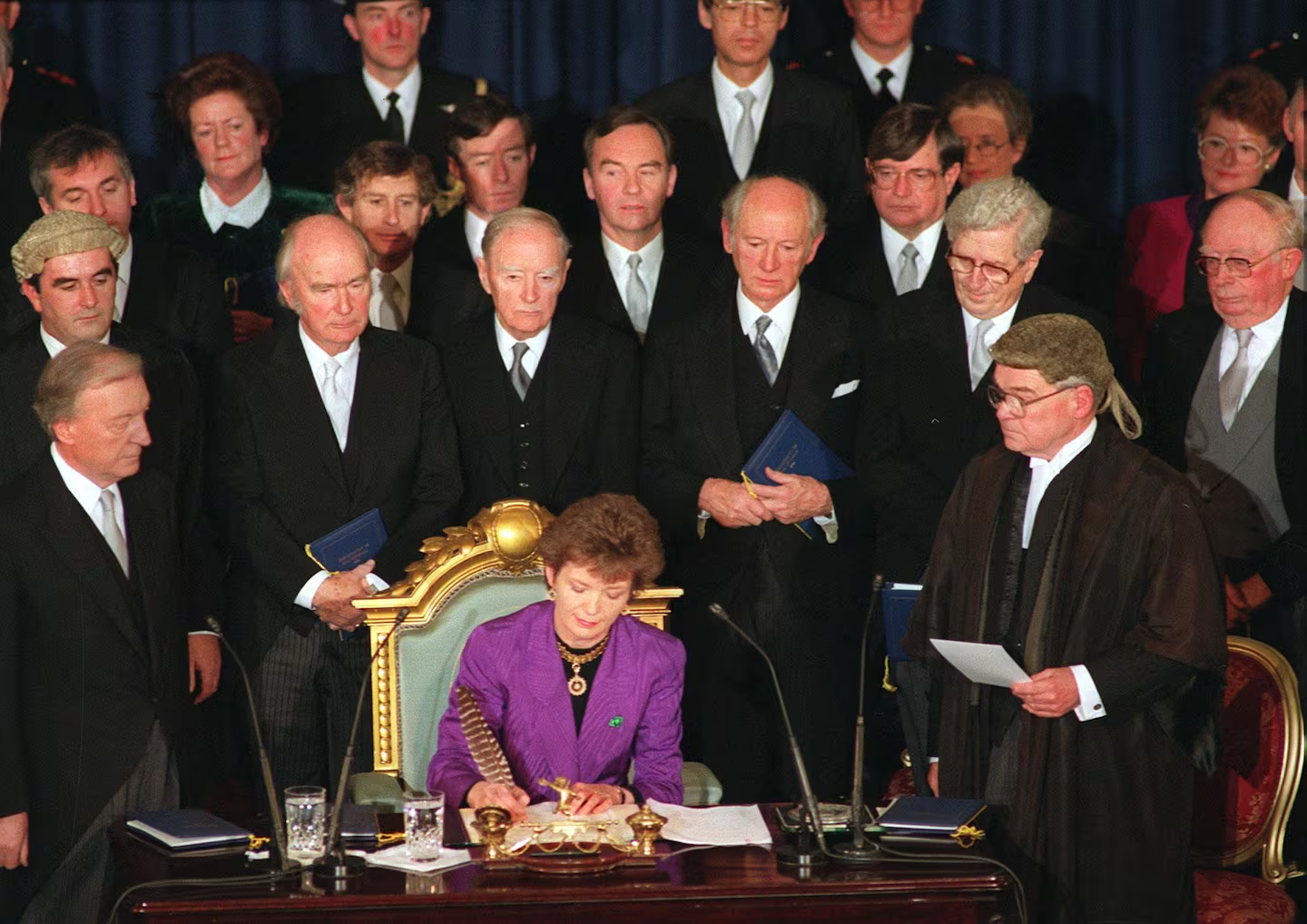
The world is in a bad place, with war, hunger and human-rights abuses. “We’re at the worst of times, because we’re facing an unprecedented situation with the climate and nature crisis. We are in a very perilous moment. We’re not making enough progress, although we are moving faster, because technology is making clean energy cheaper. But we’re not moving fast enough, and we’re being held back by the money going in the wrong direction.”
She belongs to The B Team of nonpartisan business leaders. “I’m their moral conscience, I think,” she says. As a group working to redefine accountability in business, The B Team estimates that the world spends “about $1.8 trillion a year on what’s harming us: subsidies for fossil fuel, and bad land management. By switching even some of that money, we could move faster, to protect the ecosystem that sustains us.”
It’s hard to maintain optimism in the face of it all, but she cites something she learned from Archbishop Desmond Tutu, who said, “I’m not an optimist. I’m a prisoner of hope.” That’s an approach that chimes with Robinson.
“If you look at the climate and nature crisis, I could talk about that in a way that frightens people. The energy would go out of the room, people would just put their heads down and say, there’s nothing I can do. What we’ve got to do is switch the money. That’s a human problem. That’s perfectly doable with political will. We’ve got to grow our power. We know the majority in the world, all the polls tell us this, want action on climate, including in the US, where it’s still very divisive. People know we’re not living in harmony with nature, with ecosystems that have sustained us over thousands of years. We need to advocate, and know our power and encourage politicians to be more able to take these decisions.”
She seems indefatigable. “I’m very lucky at the moment with my health,” she says. “I’m conscious the next few years are vital, that I have to do whatever I can. That’s the time I’m going to be allocated anyway, to be active. If my health continues, I will feel a huge urgency, I’ll wake up with it every day. Because the science is implacable. You can’t negotiate with science and nature. On top of that, we’re in a bad place politically in the world, we see a lot of divides opening up. We see a lot of populism, and the wrong kind of nationalism.”
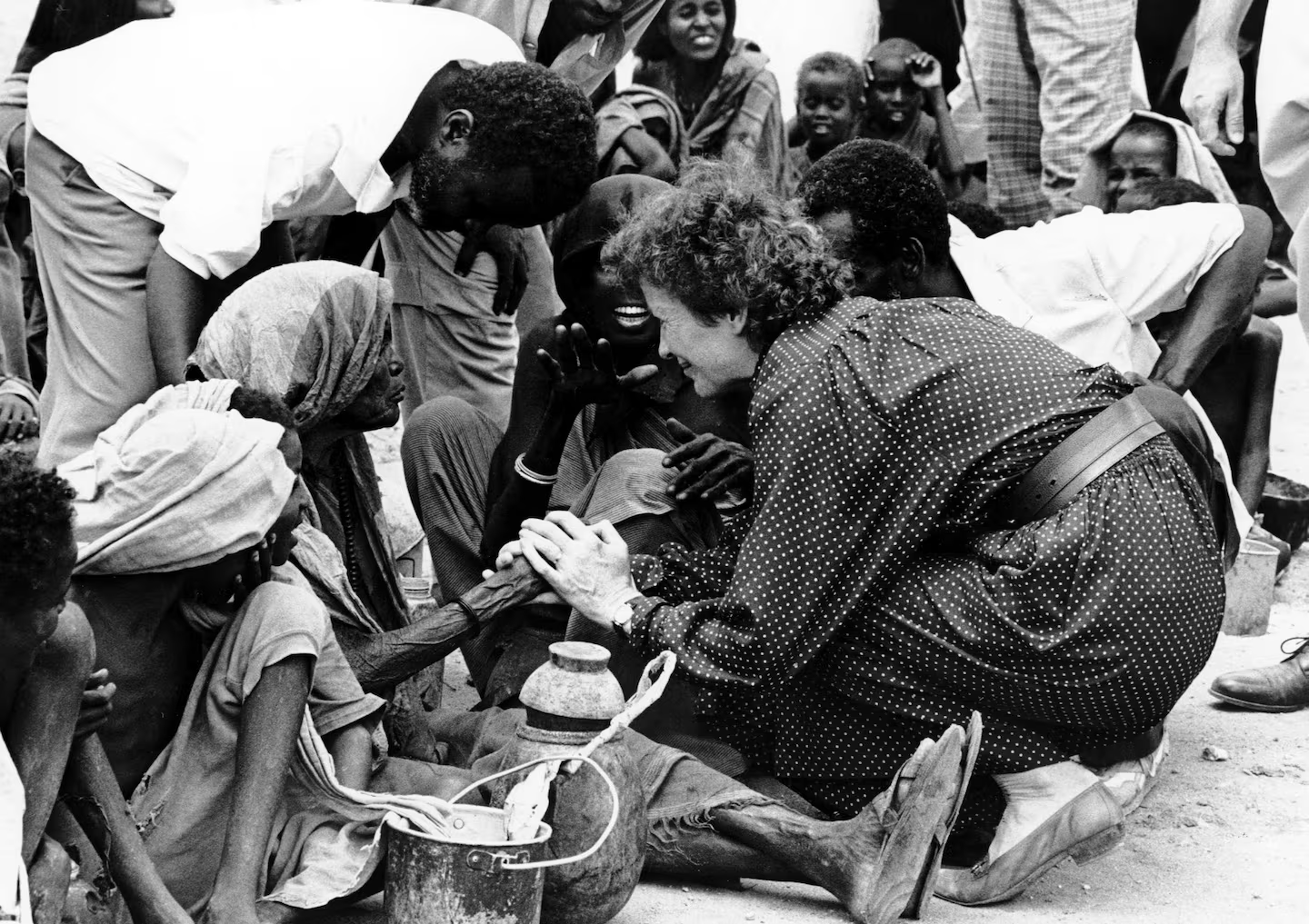
“It’s a very worrying time. We don’t know the outcome of the American election, whoever wins, because we don’t know whether it will be accepted. Obviously, I have a great hope, for America and for the world, that Kamala Harris succeeds. But even if she wins, it’s not clear it will be accepted because of the precedent [in 2020], the terrible attacks on the Capitol.” She recalls being at Harvard in the late 1960s, and thinking the US was a country secure in its democracy. “It’s a lesson in the need for constant vigilance in pursuing human rights and democracy and the rule of law,” she says.
The day Robinson was elected president of Ireland she stirred our pride and optimism. She still does. “One thing I learned as high commissioner for human rights, is that human rights are not a western idea, or an eastern idea or northern. Everywhere I went in the world, people were fighting at local level, whether in Colombia, the DRC, in Vietnam, China, wherever. Everybody wants the fulfilment that the Universal Declaration of Human Rights guaranteed in 1948.”
Mrs Robinson will be on release in Irish cinemas from August 23rd
